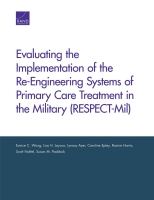| 来源类型 | Research Reports
|
| 规范类型 | 报告
|
| ISBN | 9780833088987
|
| 来源ID | RR-588-OSD
|
| Evaluating the Implementation of the Re-Engineering Systems of Primary Care Treatment in the Military (RESPECT-Mil) |
| Eunice C. Wong; Lisa H. Jaycox; Lynsay Ayer; Caroline Batka; Racine Harris; Scott Naftel; Susan M. Paddock
|
| 发表日期 | 2015
|
| 出版年 | 2015
|
| 页码 | 170
|
| 语种 | 英语
|
| 结论 |
RESPECT-Mil Is Identifying a Considerable Number of Service Members Who Are Reporting Depression and PTSD Symptoms. - Of those who visited primary care, 93 percent of service members were screened for PTSD and depression.
- Of the screened visits, 13 percent resulted in a positive screen.
- Of the positive screens, 61 percent resulted in a probable diagnosis of a mental health disorder.
Army Installations Sometimes Varied with Respect to the Identification and Referral of Service Members with Mental Health Needs. - A majority of installations (25 out of 37) were screening a high proportion of visits (ranging from 91 to 99 percent); 31 of 37 installations were screening at least 80 percent of their visits.
- For ten of the 37 installations, at least 20 percent of positive screens resulted in an accepted referral to RESPECT-Mil; 24 of the installations had rates between 10 percent and 19 percent.
Rates of Treatment Response and Remission Seen in RESPECT-Mil Were Within the Range of Other Collaborative Care Studies. - Of service members in the "depression prominent" category, 42 percent experienced a 50 percent reduction in depression symptoms from baseline to the last follow-up assessment. Other studies have reported a range of 19 percent to 53 percent of patients showing similar improvement.
- Of service members in the "PTSD prominent" category, 33 percent experienced similar decreases in symptoms. In a civilian collaborative care study with PTSD patients, 50 percent experienced decreases in symptoms with a less stringent criterion and with a longer follow-up period.
|
| 摘要 |
- Improve the recognition and assessment of depression and PTSD by streamlining screening and assessment, determining the value of screening service members already in enrolled in behavioral health care, enhancing command support, and expanding routine screening and evidence-based primary care management practices for depression and PTSD.
- Improve referrals and the management of depression and PTSD in primary care by increasing primary care provider engagement and comfort, incentivizing and supporting primary care champions, modifying program criteria given the range of symptom severity among service members referred to the program, strengthening the handoff between the primary care provider and the care facilitator, facilitating engagement and communication with service members, enlisting command in support of service members' treatment engagement and adherence, fortifying communication between providers, ensuring that the behavioral health champion role is adequately supported, and enhancing the behavioral champion role.
- Improve quality assurance monitoring by augmenting individualized and real-time performance feedback, creating incentives for sites and providers to buy in to quality improvement processes, continuing to support the RESPECT-Mil Implementation Team or similar centralized quality improvement programs, and establishing a self-monitoring process for the RESPECT-Mil Implementation Team oversight efforts.
|
| 主题 | Depression
; Health Care Program Evaluation
; Mental Health Treatment
; Military Health and Health Care
; Posttraumatic Stress Disorder
|
| URL | https://www.rand.org/pubs/research_reports/RR588.html
|
| 来源智库 | RAND Corporation (United States)
|
| 资源类型 | 智库出版物
|
| 条目标识符 | http://119.78.100.153/handle/2XGU8XDN/107903
|
推荐引用方式
GB/T 7714 |
Eunice C. Wong,Lisa H. Jaycox,Lynsay Ayer,et al. Evaluating the Implementation of the Re-Engineering Systems of Primary Care Treatment in the Military (RESPECT-Mil). 2015.
|
|
文件名:
|
1495316364484.jpg
|
|
格式:
|
JPEG
|

|
文件名:
|
RAND_RR588.pdf
|
|
格式:
|
Adobe PDF
|
除非特别说明,本系统中所有内容都受版权保护,并保留所有权利。